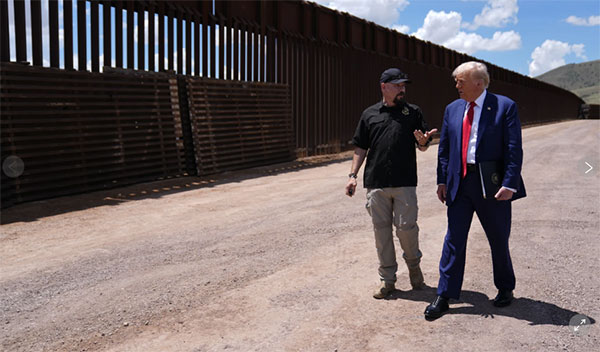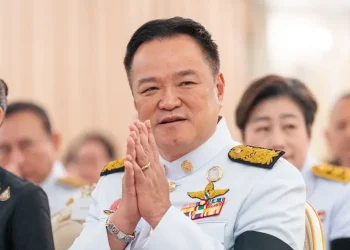Trump’s Day 1 Goals: Deportations, Pardons for Jan. 6 Rioters, and Erasing Criminal Charges
WASHINGTON (AP) — Donald Trump recently stated he wouldn’t act as a dictator—except, he added, “on Day 1.” He has shared an extensive list of actions he intends to implement immediately upon entering the White House.
On this “first day,” Trump says he would start mass deportations of migrants, roll back Biden administration policies, reorganize the federal workforce, pardon people convicted for their roles in the Jan. 6 Capitol attack, and more. Here’s a breakdown of what Trump says he’ll prioritize on Day 1 and how feasible these actions are.
Dismissing Federal Criminal Cases Against Him
Trump has promised to remove Special Counsel Jack Smith, who has charged him in two federal cases related to the 2020 election and handling of classified documents. While long-standing Justice Department policy says a sitting president can’t be prosecuted, Trump has also hinted he might seek to expunge or neutralize charges against him at the federal level. However, he can’t dismiss state charges, such as those in New York or Georgia, though these may be delayed during his potential presidency.
Pardoning Jan. 6 Rioters
Since launching his 2024 campaign, Trump has called the Jan. 6 rioters “unbelievable patriots” and pledged to pardon many of them on Day 1. As president, Trump would have the authority to issue pardons for federal crimes, halt ongoing prosecutions, and instruct the attorney general to dismiss related cases. However, Trump has said some individuals may not qualify for pardons if they acted excessively.
Overhauling the “Deep State” in Government
Trump has proposed revamping the federal workforce by firing thousands of career employees he considers part of the so-called “deep state” who, he claims, work against him. He would aim to classify some employees as “political,” enabling easier dismissals and replacement with loyalists. While President Biden repealed Trump’s 2020 “Schedule F” order, which facilitated these firings, Trump could attempt to reintroduce it, though implementing such a policy could take years.
Imposing Tariffs on Imports, Especially from China
Trump has emphasized imposing high tariffs on imported goods, specifically targeting China. He argues that import taxes could protect U.S. jobs, reduce the deficit, and strengthen national security. In 2018, he set tariffs on steel and aluminum without needing Congressional approval, citing national security concerns under the Trade Expansion Act of 1962. Trump has suggested a 25% tariff on Mexican imports if the country does not curb drug and criminal activity entering the U.S.
Rolling Back Transgender Protections
Opposing transgender rights is a central theme of Trump’s campaign. He has vowed to repeal Biden’s Title IX protections for transgender students, arguing that treating transgender students differently constitutes discrimination. Trump says he would reverse this policy through an executive order on Day 1 and proposes to cut funding for schools promoting content he considers inappropriate, though doing so may require Congressional support.
Increasing U.S. Oil Drilling
Trump wants to reverse climate policies, reduce environmental protections, and promote U.S. fossil fuel production. He has promised to “drill, drill, drill” on Day 1, aiming to open Arctic areas for drilling and lower energy costs. This could include removing wind projects and other climate-friendly initiatives.
Ending the Russia-Ukraine War
Trump has repeatedly claimed he could end the Russia-Ukraine conflict “in one day” by brokering a peace deal. Though many doubt this timeline, Trump has said he would bring both sides to the table immediately upon taking office. However, experts question the feasibility of achieving peace this quickly.
Initiating Large-Scale Deportations
Trump has outlined plans for what he calls the “largest deportation program in American history,” aiming to remove millions of undocumented immigrants. He announced he would assign Tom Homan, former acting Immigration and Customs Enforcement (ICE) director, to lead this effort. Trump also suggests invoking the rarely-used 1798 Alien Enemies Act, allowing the deportation of non-citizens from “hostile” nations. Implementing such a large-scale operation, however, would require significant resources and international cooperation.
This article was rewritten by JournosNews.com based on verified reporting from trusted sources. The content has been independently reviewed, fact-checked, and edited for accuracy, neutrality, tone, and global readability in accordance with Google News and AdSense standards.
All opinions, quotes, or statements from contributors, experts, or sourced organizations do not necessarily reflect the views of JournosNews.com. JournosNews.com maintains full editorial independence from any external funders, sponsors, or organizations.
Stay informed with JournosNews.com — your trusted source for verified global reporting and in-depth analysis. Follow us on Google News, BlueSky, and X for real-time updates.














